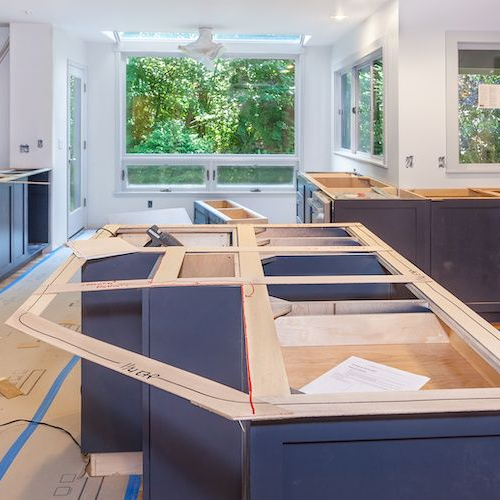Selling a house as is: What to know
Jul 7, 2025
•9-minute read
Sometimes, life calls for a fast and simple home sale, one that doesn't require spending time, money, or energy on repairs. Selling your home as is means offering it in its current condition – no updates required.
What does selling a house 'as is' mean?
When you sell a house as is, you're telling buyers up front: What you see is what you get. You're offering the property in its current condition, warts and all, and the buyer agrees to take it that way.
But selling as is doesn't mean you're totally off the hook. Legally, you're still responsible for disclosing any known problems with the home, such as foundation issues, mold, roof leaks, or outdated wiring. While you don't have to fix them, you do have to be transparent about them. Full disclosure not only keeps you compliant with state and federal law, but it also builds trust with buyers, reducing the risk of deal-breaking surprises later in the process.
Here's what's typically involved when you sell a house as is:
- No required repairs or upgrades. You're not expected to fix anything before listing. The home goes on the market exactly as it stands.
- Clear buyer communication. Buyers are told upfront that the property will be sold in its current condition.
- Disclosure is still required. Sellers must still comply with state-specific disclosure laws.
- Market value reflects condition. Your listing price should account for any needed repairs or updates.
- Inspections still happen. Buyers often still request a home inspection and understand the seller won't make any repairs.
Why do people sell homes as is?
An as-is sale often is about more than just the condition of the home. It's also about circumstances. Here are some common reasons sellers choose this route:
- Financial hardship. When there's no room in the budget for repairs or renovations.
- Urgency or tight timelines. Job relocations, pending foreclosure, or significant life changes may require a quick sale.
- Convenience. Avoiding the stress of managing repairs, contractors, or staging.
- Inherited property. Selling a home you didn't live in and don't want to maintain or update.
- Unexpected life events. Medical bills, divorce, or the death of a loved one can make a fast, simplified sale a top priority.
If any of these situations sound familiar, selling your home as is could help you move forward faster, with less stress, fewer up-front costs, and more clarity during a transitional time.
Pros of selling a house as is
Selling your home as is can feel like a breath of fresh air, especially when life is already complicated enough. If you're staring down a long list of needed repairs or simply don't have the time, energy, or funds to get your home market-ready, an as-is sale can offer relief and a more direct path to your next chapter.
Here are some of the key advantages to consider:
- Faster sale process. Selling as is often attracts cash buyers, investors, or buyers who are comfortable with fixer-uppers. These buyers usually aren't dependent on traditional mortgage approvals, which can speed up the closing timeline. That means less waiting, fewer delays, and a faster way to move on, especially if you're under pressure to sell quickly.
- Save money on repairs and updates. Home improvements can cost thousands, or tens of thousands, of dollars, depending on what your property needs. By choosing to sell as is, you avoid the out-of-pocket expenses associated with new appliances, roof repairs, landscaping, painting, and staging. It's a practical solution when your priority is minimizing costs.
- No repair negotiations. One of the most significant stressors in a traditional home sale is the back-and-forth over inspection findings. Buyers request credits or demand repairs. Selling as is helps sidestep that headache. Buyers know from the beginning that you won't be fixing anything, so there's less pressure to renegotiate after an inspection.
- Attract cash buyers and investors. Many experienced investors look for homes sold as is. They have the capital and resources to handle repairs and renovations efficiently, and they often make offers quickly. If your property has investment potential, you may receive serious interest without needing to do any prep work at all.
- Less time spent preparing the home for sale. When you're selling as is, there's no need to deep clean every corner, repaint the walls, or obsess over curb appeal. While a clean and presentable home can still help, you won't be expected to create the "HGTV-ready" version of your property. This is especially helpful if you're emotionally overwhelmed, physically unable, or simply want to move forward without adding to your stress.
- Streamlined selling experience. For many sellers, choosing to sell as is isn't just about money; it's about peace of mind. Whether you're facing a personal crisis, managing an estate, or dealing with a significant life transition, simplifying the sale can provide much-needed clarity and control.
While an as-is sale might not deliver top dollar, it can provide something just as valuable: freedom. Freedom from repairs, uncertainty, and delays. Freedom to start fresh.
Cons of selling a house as is
Selling a house as is may simplify your life in the short term, but it's important to understand the full picture before you commit. While this approach works well for many sellers, it does come with trade-offs that could affect your financial outcome, buyer interest, and timeline.
Let's take a clear-eyed look at the potential downsides so you can decide what matters most to you:
- Lower sale price potential. In most cases, homes sold as is go for less than comparable move-in-ready properties. Buyers often assume the worst when they see "as is" and factor the cost of repairs and the risk into their offers. Depending on the property's condition, your home may sell for 5%–20% below market value. That discount can be significant if you're relying on the proceeds to fund your next move.
- Limited pool of potential buyers. Not every buyer is comfortable purchasing a home that needs work. Traditional buyers, especially first-time buyers, may lack the budget, experience, or desire to undertake repairs. This can narrow your buyer pool to primarily cash buyers, investors, or house flippers. Fewer interested parties can sometimes mean fewer offers and longer time on the market.
- Financing challenges for buyers. If a buyer wants to use a mortgage to purchase your home, the lender may require the property to meet specific safety and livability standards. Loan types like FHA, VA, or USDA are especially strict. If your home doesn't meet those requirements, the buyer's financing could fall through, unless they're willing to take on the repairs beforehand or switch to a conventional loan.
- Legal and disclosure obligations. Selling as is does not mean you're free from your legal responsibilities. State laws, and in some cases, federal laws, require you to disclose known issues with the property, such as water damage, mold, lead paint, or structural concerns. Failing to disclose can open the door to future legal problems, even after the sale has closed. Honesty and transparency are nonnegotiable.
- Fewer or lower offers. Some buyers see "as is" and walk away without ever setting foot inside. Others use the term as leverage to offer well below the asking price. It's not uncommon for as-is homes to receive fewer offers overall, and those offers may come with steeper discounts. That doesn't mean you won't sell, but you'll want to prepare yourself for a different kind of negotiation.
- Buyer perception and stigma. The label "as is" can raise red flags, even if your home only has minor cosmetic flaws. Some buyers assume the home has hidden issues or that the seller is trying to offload a problem. Strategic marketing and transparency can help mitigate this stigma, but it remains a reality that may influence how your listing is perceived.
Selling as is can be a trade-off: you gain speed, ease, and financial relief in exchange for a potentially lower price and a smaller pool of buyers. The key is knowing your priorities. If getting top dollar is your top goal, you might reconsider this route. However, if peace of mind, speed, or simplicity outweighs maximizing profit, selling as is might be the exact right call.
Factors to consider before selling as is
Selling your home as is isn't just a checkbox; it's a strategic decision that should reflect your unique situation. While this route can provide speed and relief from mounting stress, it also requires careful consideration. Before listing your home in its current condition, take a moment to consider the key factors that can influence how smoothly the process goes and how much you ultimately walk away with.
Condition of the property
The state of your home is one of the biggest factors in determining how well an as-is sale will perform. If your property is generally clean, safe, and functional, just a little dated, it will likely attract more buyer interest and stronger offers. Cosmetic imperfections, such as worn carpeting or outdated fixtures, are easier for buyers to overlook or handle themselves.
However, if your home has structural damage, water intrusion, mold, or systems in disrepair (think roof, plumbing, or electrical), the buyer pool will shrink. These homes often appeal primarily to investors, house flippers, or contractors who are comfortable taking on bigger projects. It doesn't mean you can't sell – as-is homes sell every day – but be prepared for a price that reflects the cost and risk of repairs.
Market conditions
Real estate is hyper-local and constantly shifting. The success of an as-is sale can depend heavily on the current market in your area. If you're selling in a seller's market, where demand outweighs supply, buyers may be more willing to overlook flaws just to secure a home. You may even receive multiple offers or bidding wars despite the property being sold as is.
In a buyer's market, where inventory is higher and buyers have more options, selling as is can be more challenging. Expect more days on market and more price-sensitive offers. Before listing, consult with a local real estate agent to gauge the current market conditions in your area. A competitive market can turn an as-is listing into an advantage, rather than a liability.
Urgency of the sale
If time is of the essence, selling as is may be your fastest path to the closing table. Whether you're dealing with a job relocation, a family emergency, divorce, or the looming threat of foreclosure, eliminating the repair process can significantly shorten your timeline.
Without waiting for contractors, estimates, or renovation delays, you can move quickly, and that can be invaluable in high-pressure situations. Cash buyers can often close in as little as 7–10 days, giving you the freedom and flexibility you need when it matters most.
Financial needs
Finances play a major role in whether selling as is makes sense. If you don't have the resources to invest in major repairs or you simply can't take on the financial risk, selling the property in its current condition may be the most practical choice. You might receive a lower offer, but you'll avoid up-front costs, debt, or dipping into savings.
In some cases, the quick access to cash from a fast sale is worth more than the potential gains of fixing and listing later. The money you get from selling as is could help you pay off debt, relocate, or invest in a more stable housing situation. It's a trade-off, but sometimes it's the right one.
Working with a local real estate agent
Choosing to sell as is doesn't mean you have to go it alone. A seasoned real estate agent can be your greatest ally, helping you navigate the complexities of the transaction with clarity and confidence. They understand local disclosure laws, pricing strategies, and marketing techniques that target the right types of buyers, such as investors or flippers.
An agent can also manage expectations, field tough questions from buyers, and handle negotiations with professionalism and care. With the right agent by your side, you can avoid common pitfalls, protect your interests, and sell with more peace of mind, even when selling as is.
Tips for selling your house as is
If you've decided to sell your house as is, preparation still matters. Here are a few tips to help you make the most of your sale:
- Get advice from a real estate agent: Choose someone experienced with as-is sales in your area to guide you through the process.
- Be up front with disclosures: Honesty builds trust. Disclose all known issues to avoid legal trouble later.
- Do a pre-listing inspection: Know what buyers will discover. A home pre-inspection can help you set a realistic price and avoid surprises.
- Get repair estimates: Even if you're not making repairs, knowing the cost gives you leverage in negotiations.
- Set a fair and competitive price: Price your home to reflect its current condition and attract the right buyers.
- Highlight the positives: Focus on what works, great location, solid structure, natural light, or a large yard can all appeal to buyers.
- Market strategically: Target cash buyers, investors, or buyers looking for a fixer-upper. Platforms like MLS, investor networks, or "We Buy Houses" companies can be effective.
- Be flexible with showings: The more accessible your home is to potential buyers, the faster it can sell.
- Stage key areas: Even a basic cleaning or decluttering of the main living space can make your home more appealing without a major investment.
The bottom line: Is selling a house as is right for you?
Remember, selling as is doesn't release you from disclosing known issues. Having the home inspected before listing it for sale can help you stay compliant and build trust with buyers.
If you're ready to move on from your current home and begin the next chapter, we're here to help. Whether you're buying your next home, downsizing, or relocating, a Verified Approval from Rocket Mortgage® can give you the financial confidence to move forward with peace of mind.

Christian Byers
Christian Byers is a freelance writer and editor with experience covering diverse topics. He has a B.S. in Journalism and a B.A. in Communications from Eastern Michigan University. His experience as a writer and editor includes publications such as The Eastern Echo, Rocket Central, and Woodward Sports Network.
Related resources

8-minute read
Buying a fixer-upper house: Pros and cons
You can buy fixer-upper houses at lower prices and renovate them to enjoy or sell. Learn how this works – and uncover the pros and cons of buying a fixer-...
Read more

6-minute read
What does turnkey mean?
A turnkey property is a type of real estate that’s move-in ready and needs few or no renovations. You may pay more for these homes, but is it worth it?
Read more

9-minute read
FSBO meaning: Buying a house that’s for sale by owner
Buying a house that's listed as for sale by owner (FSBO) is different from buying through a real estate agent. Discover the process of buying a FSBO home.
Read more